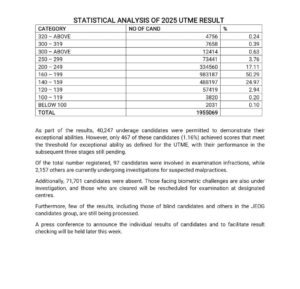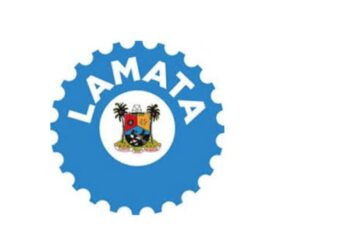The Joint Admissions and Matriculation Board (JAMB) has released the statistical breakdown of the 2025 Unified Tertiary Matriculation Examination (UTME), revealing a concerning trend in performance among Nigerian candidates.
Of the 1,955,069 candidates who sat for the examination, only 12,414 scored above 300, representing just 0.63% of the total.
The data shows that the majority of the candidates—over 50%—scored between 160 and 199, while 17.11% fell within the 200–249 score bracket. This means only a fraction of students scored within the competitive range typically required for admission into highly sought-after courses and universities.
More worrisome is the fact that only 4,756 candidates (0.24%) scored 320 and above, highlighting a significant gap in high academic performance. Meanwhile, 2,031 candidates scored below 100.
In a special category, 40,247 underage candidates were allowed to sit for the examination under the exceptional ability clause. However, only 467 of them (1.16%) met the exceptional ability threshold, and their performance is still undergoing further review through subsequent stages.
Security and Integrity Concerns
Issues of examination integrity also surfaced, with 97 candidates confirmed to have engaged in examination infractions and 2,157 others currently under investigation for suspected malpractices. This reflects persistent challenges JAMB faces in curbing exam-related misconduct.
Additionally, 71,701 candidates were absent from the examination. The Board stated that some of these candidates faced biometric issues, and investigations are ongoing. Those cleared will be rescheduled for the exam.
Marginalised Groups Still Waiting
The Board also disclosed that the results of some candidates—especially those in the blind category and JEOG candidates (Joint Examination of the Oppressed Group)—are still being processed, signaling delays for these special needs groups.
What the Numbers Tell Us
The overall performance shows a significant concentration of scores in the middle and lower bands, which could affect the admission process for competitive courses. It raises questions about the preparedness of students, the effectiveness of teaching and learning strategies in secondary schools, and the role of socio-economic factors in educational outcomes.
As the nation waits for a scheduled press conference to announce individual results and open the result-checking portal, education stakeholders are likely to engage in deeper discussions around exam reforms, candidate support systems, and the quality of education across Nigeria.
This figure is part of the 1,955,069 results processed so far, according to a statement shared by JAMB via its official handle on X (formerly Twitter) @JAMBHQ.




















































































 EduTimes Africa, a product of Education Times Africa, is a magazine publication that aims to lend its support to close the yawning gap in Africa's educational development.
EduTimes Africa, a product of Education Times Africa, is a magazine publication that aims to lend its support to close the yawning gap in Africa's educational development.